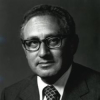Henry A. Kissinger

Henry A. Kissinger
Henry Alfred Kissingeris an American diplomat and political scientist. He served as National Security Advisor and later concurrently as United States Secretary of State in the administrations of presidents Richard Nixon and Gerald Ford. For his actions negotiating the ceasefire in Vietnam, Kissinger received the 1973 Nobel Peace Prize under controversial circumstances, with two members of the committee resigning in protest. Kissinger later sought, unsuccessfully, to return the prize. After his term, his advice has been sought by world leaders...
NationalityGerman
ProfessionStatesman
Date of Birth27 May 1923
CountryGermany
What is applicable is to understand that first of all China has undergone a huge revolution in the last years. Anyone who saw China as I did in 1971 - and for that matter even in 1979, because not much had changed between 1971 and 1979 - and sees China today, knows one is in a different economic system.
Well it did not make excessive sense to say that 20 million people are the recognized government of a billion people that have their own institutions. We did not change it in the sense that we said this has to end, but there was a U.N. vote that transferred the legitimacy of China from Taiwan to Beijing. Beijing was recognized as the government of all of China. Then, under President Carter, we followed what the U.N. had already done eight years earlier.
More and more of the Taiwanese economy is connected with the mainland. There are more and more exchanges taking place. There's no reason to doubt that over a period of ten years or so, or maybe more, the conditions of life on the two sides of the Taiwan Strait will become more comparable, and the dialogue on the political level therefore easier.
China has had a long and complex history and has managed to evolve its own culture for 4,000 years. It therefore not necessarily true that we know exactly what is best for the internal structure of China.
China is a country with a record of continuous self-government going back 4,000 years, the only society that has achieved this. One must start with the assumption that they must have learnt something about the requirements for survival, and it is not always to be assumed that we know it better than they do.
I would say the special experience of American wartime policy in the last 40 years, from Vietnam on, is that the war itself became controversial in the country and that the most important thing we need in the current situation is, whatever disagreements there may be on tactics, that the legitimacy of the war itself does not become a subject of controversy. We have to start with the assumption, obviously, that whatever administration is conducting a war wants to end it.
Create the impression of endless willingness to compromise and you almost invite deadlines. That's the challenge we now have in North Korea and have had in North Korea for 10 years. In this sense, diplomacy and foreign policy and other elements of political activity have to be closely linked and have to be understood by the negotiators
In 10 years, there will be no more Israel.
What China would do, I cannot predict. China has all but given up the claim to the use of force, except in the circumstance of Taiwan declaring its independence. That is a huge step forward over what the situation was many years ago.
I knew Deng Xiaoping when he came out of prison. He had, after all, been imprisoned for nearly ten years by Mao. I know what China looked like before he took over, and so in my own mind, I don't think of Deng Xiaoping as an oppressor. I think of somebody who, faced with that crisis, made a very painful and decision with which I cannot agree. But I also think of him as a great reformer.
I don't know what happens in the next years. But I cannot now design a policy in which we try to keep China from developing, because in some years, if they develop, they might be rich enough to challenge us, and adopt the principle that we will hold down any state that might in the future become strong. That would make us a world empire for which we wouldn't have the talents or the convictions.
I have been observing China for more than 30 years and am impressed how logically and wisely it tackles its problems. Obviously the international system could be unbalanced by China's rising power - if we don't prepare ourselves for the new competitive situation, that is. But it is an economic challenge, not aggression on the level of Hitler.
Don't be too ambitious. Do the most important thing you can think of doing every year and then your career will take care of itself.
I've often said that the desire to lecture China on how it should behave in the world is wrong. China was around for thousands of years even before America existed. It could even be that China's growing power will allow itself to be slowed down. But as long as this immense empire doesn't fall apart, it will become an important factor in global politics.